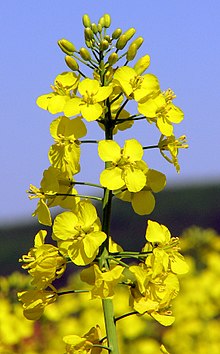Rapeseed

COMMON NAMES: Rapeseed, Rape, Oilseed rape, Canola
BOTANICAL NAME: Brassica napus Linnaeus
DESCRIPTION: A bright yellow flowering member of the Brassicacea family (mustard or cabbage family). It is a mustard crop grown primarily for its seed which yields about forty percent oil and a high-protein animal feed.
HABIT: Canola is widely adapted, particularly to the cool extremes of the temperate zones. Minimum temperatures for growth have been reported to be near 32°F. The crop will germinate and emerge with soil temperatures at 41°F but the optimum is 50°F. Winter annual varieties are grown where adequate snow covers or mild winters are common. The crop has been produced successfully in Michigan without benefit of snow cover. Planting date has a dramatic effect on survival however.
USES: Like soybean, canola contains both high oil content as well as high protein content. It contains about 40% oil and 23% protein compared to 20 and 40%, respectively, for soybean. Like soybean, when the oil is crushed out, it leaves a high quality, high protein (37%) feed concentrate which is highly palatable to livestock.
Rapeseed production became popular in North America during World War II as a source of lubricants. Its oil has the property of adhering well to moist metal, making it an ideal lubricant for marine engines.
FACTS: Rapeseed is genetically engineered. Canada paid the FDA the sum of $50 million to have rape registered and recognized as "safe". (Source: Young Again and others) Rapeseed is lubricating oil used by small industry. It has never been meant for human consumption.
It is derived from the mustard family and is considered a toxic and poisonous weed, which when processed, becomes rancid very quickly. It has been shown to cause lung cancer (Wall Street Journal: 6/7/95) It is very inexpensive to grow and harvest. Insects won't eat it. Some typical and possible side effects include loss of vision, disruption of the central nervous system, respiratory illness, anemia, constipation, increased incidence of heart disease and cancer, low birth weights in infants and irritability.
Generally Rapeseed has a cumulative effect, taking almost 10 years before symptoms begin to manifest. It has a tendency to inhibit proper metabolism of foods and prohibits normal enzyme function. Canola is a Trans Fatty Acid, which has shown to have a direct link to cancer. These Trans Fatty acids are labeled as hydrogenated or partially hydrogenated oils. Avoid all of them! According to John Thomas' book, Young Again, 12 years ago in England and Europe, rape seed was fed to cows, pigs and sheep who later went blind and began attacking people. There were no further attacks after the rape seed was eliminated from the diet. vSource: David Dancu, N.D.
CANOLA OIL - WHERE DID IT COME FROM?
How much do we know about it? Here are some facts:
- Used as a lubricant, fuel, soap and synthetic rubber base as well as an illuminant for slick color pages in magazines.
- It forms latex-like substances that cause red blood corpuscles to clump together.
- It's real name is RAPESEED OIL, renamed, CANOLA OIL, (Canada Oil) for obvious reasons. It's one of the main crops grown in Canada where it is being field tested. It's grown in the United States as well.
- Rape Oil was widely used in animal feeds in England and Europe between 1986-1991 but no longer is used because of the animals that went blind and mad ('MAD COW DISEASE').
- Experts agree that the effects of ingested Rapeseed Oil take at least 10 years to manifest - so not to be concerned.
- Rapeseed is a member of the mustard family, one of the most toxic of all plants, and is shunned by insects.
- Mustard gas, which was banned in war because it blisters lungs and skin, is made from rapeseeds.
- Irradiation is used to turn the rapeseed oil into acceptable Canola Oil?
Strange new diseases involving the nervous system may be caused by Canola oil which dissolves the myelin sheath off of the nerves throughout the body. As a matter of fact, the heating of most oils during the cooking process does the same thing. Very gradually over the years, symptoms develop, which at first are perhaps only annoying, but which eventually will be diagnosed as a disease.
More Information:
- http://www.hbci.com/~wenonah/new/canola.htm (from ACRES and Sally Fallon)
- http://www.truthaboutabs.com/the-canola ... ption.html
- http://www.aspartame.ca/page_oho3.htm#HOAX
- http://www.aspartame.ca/page_oho3.htm#top http://articles.mercola.com/sites/artic ... a-oil.aspx
See Fat Diet Newsletter
Search Library Topics Search Newspaper Columns
